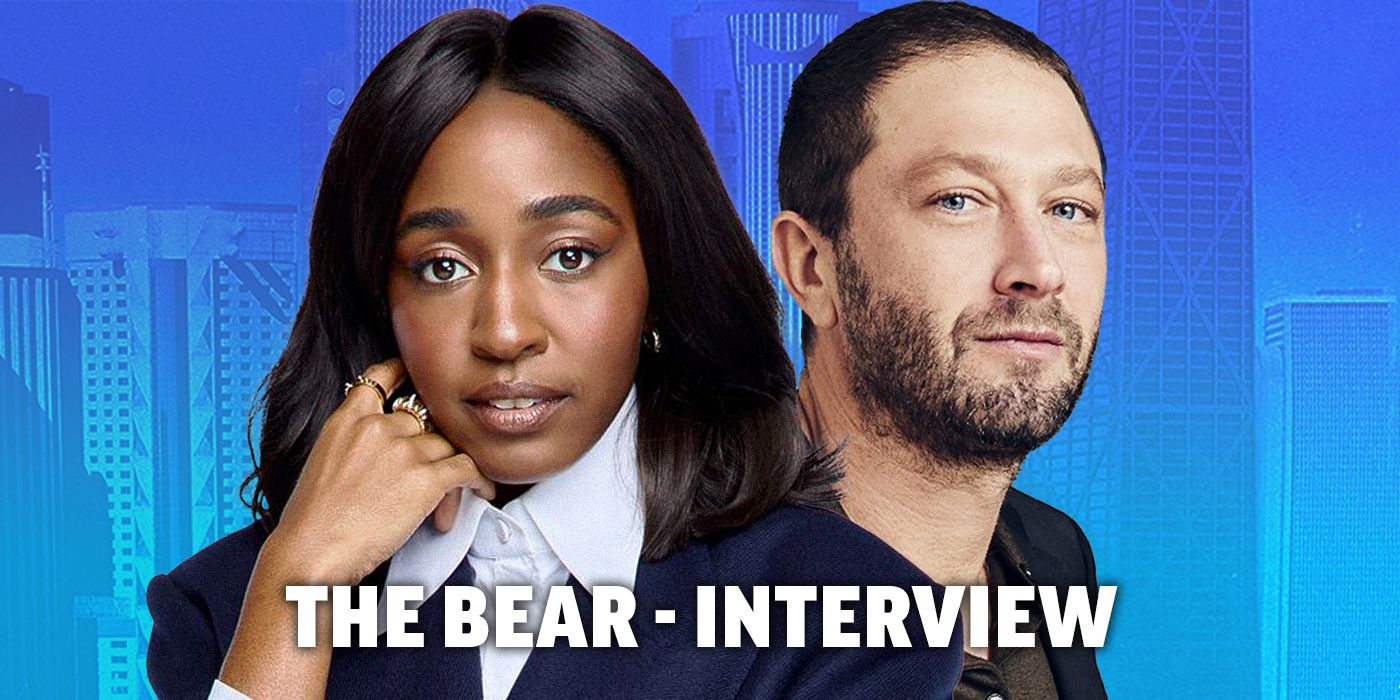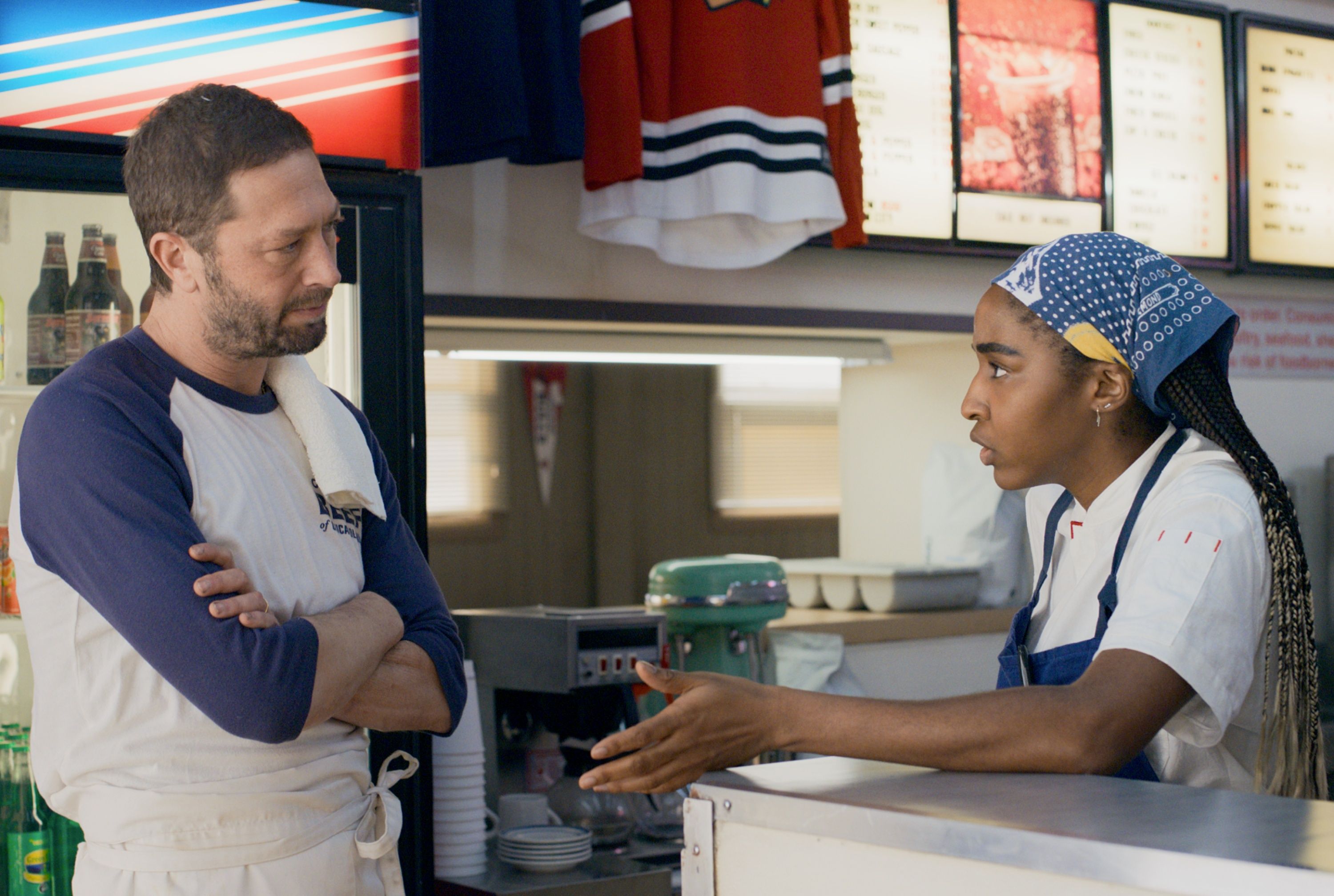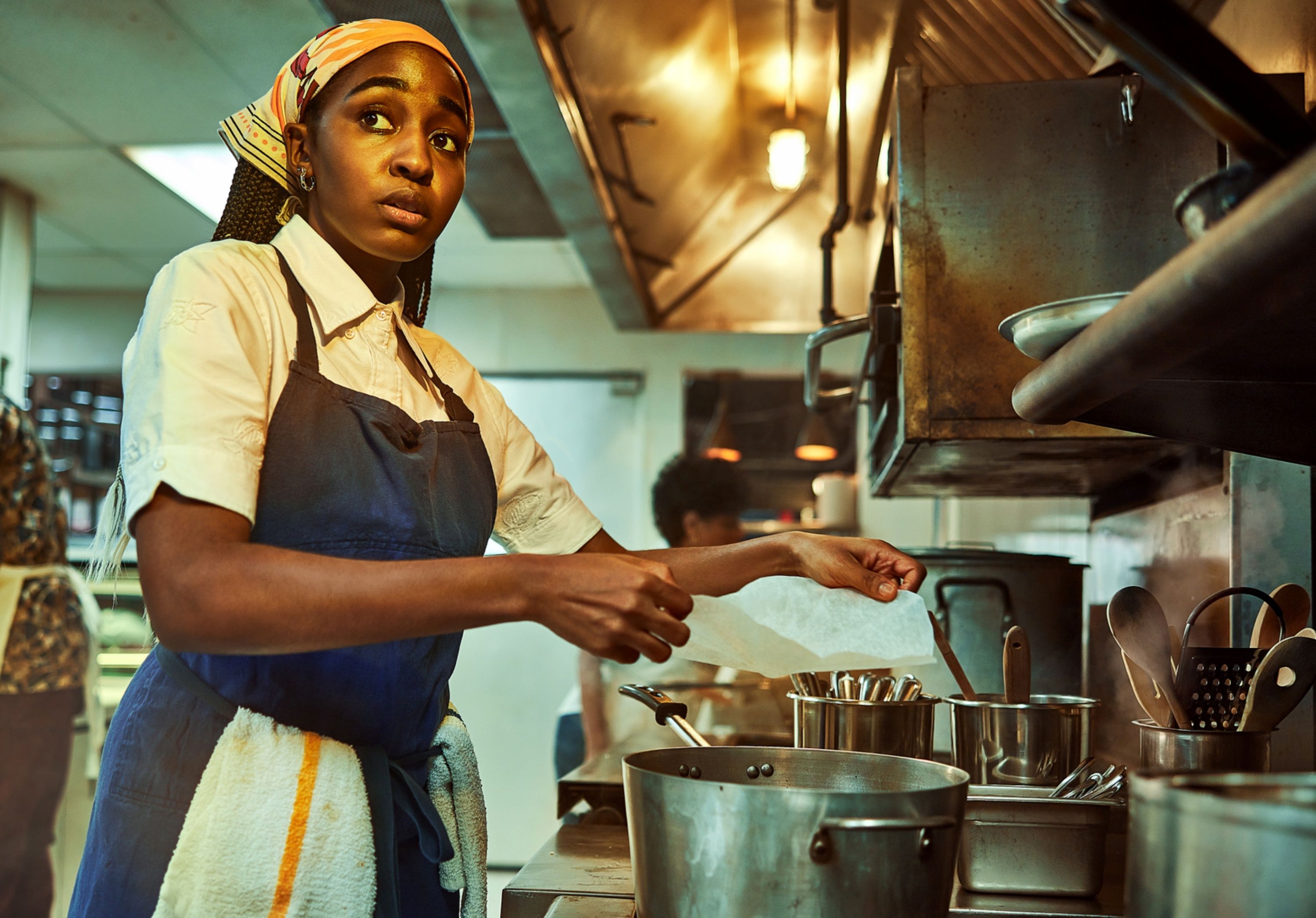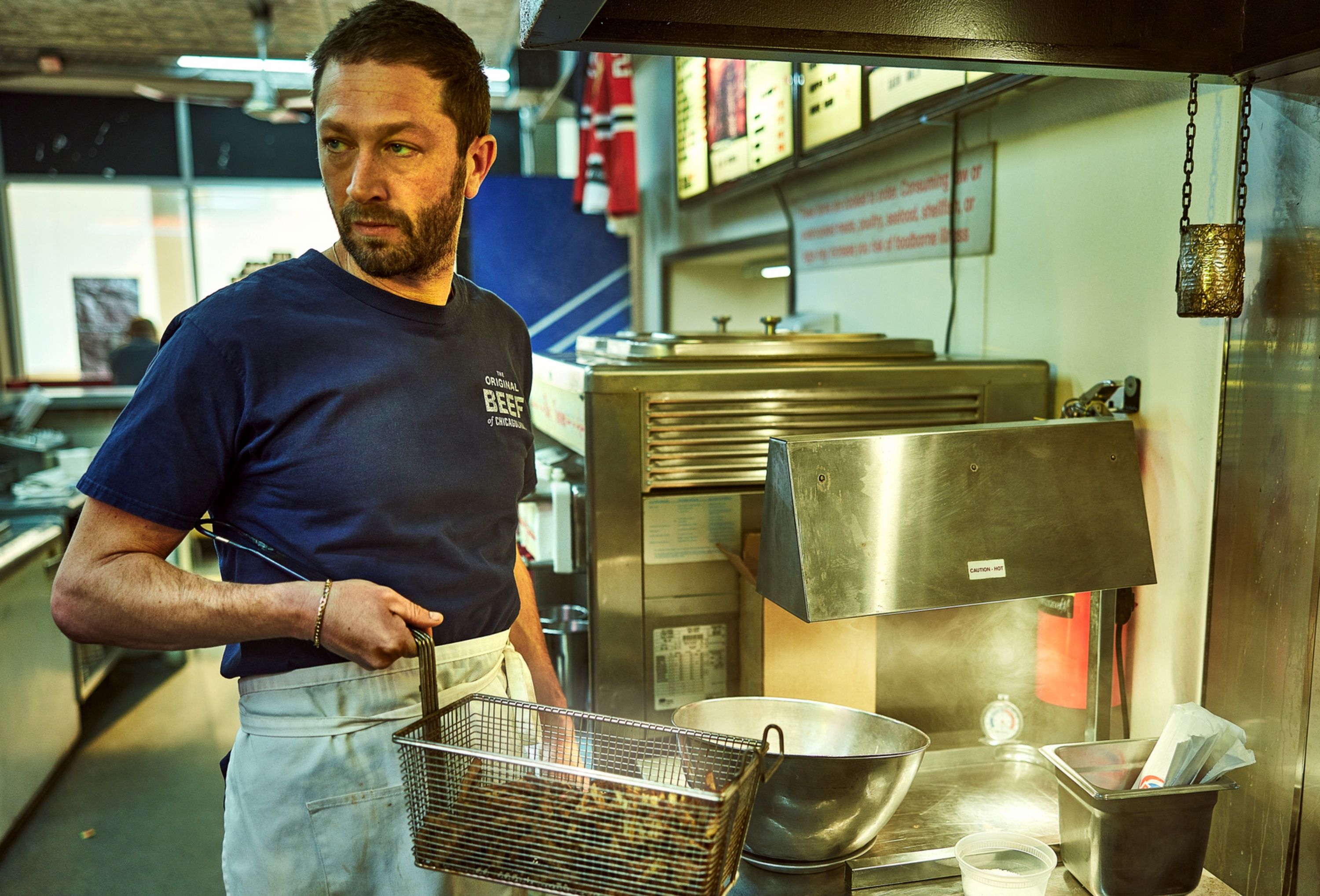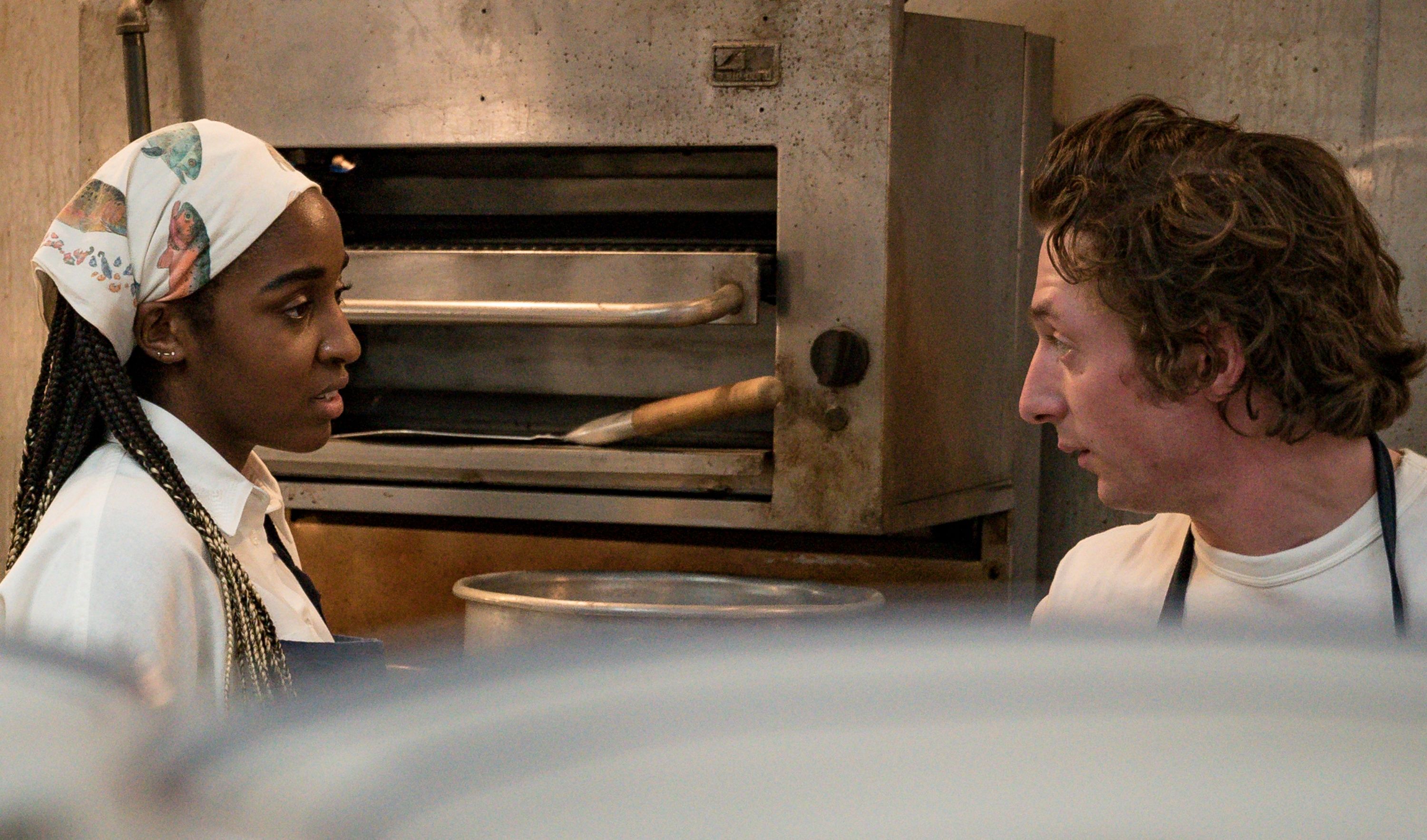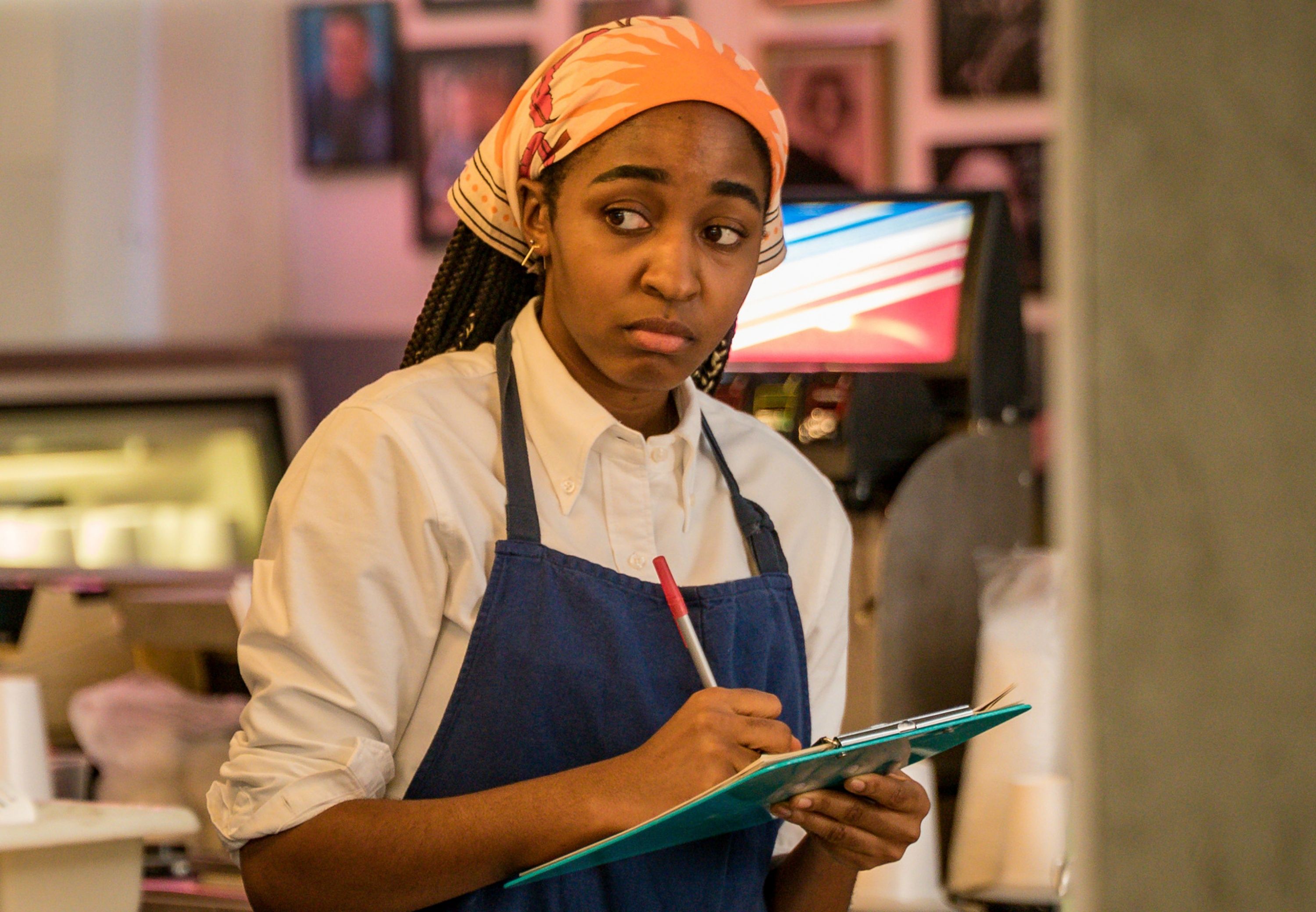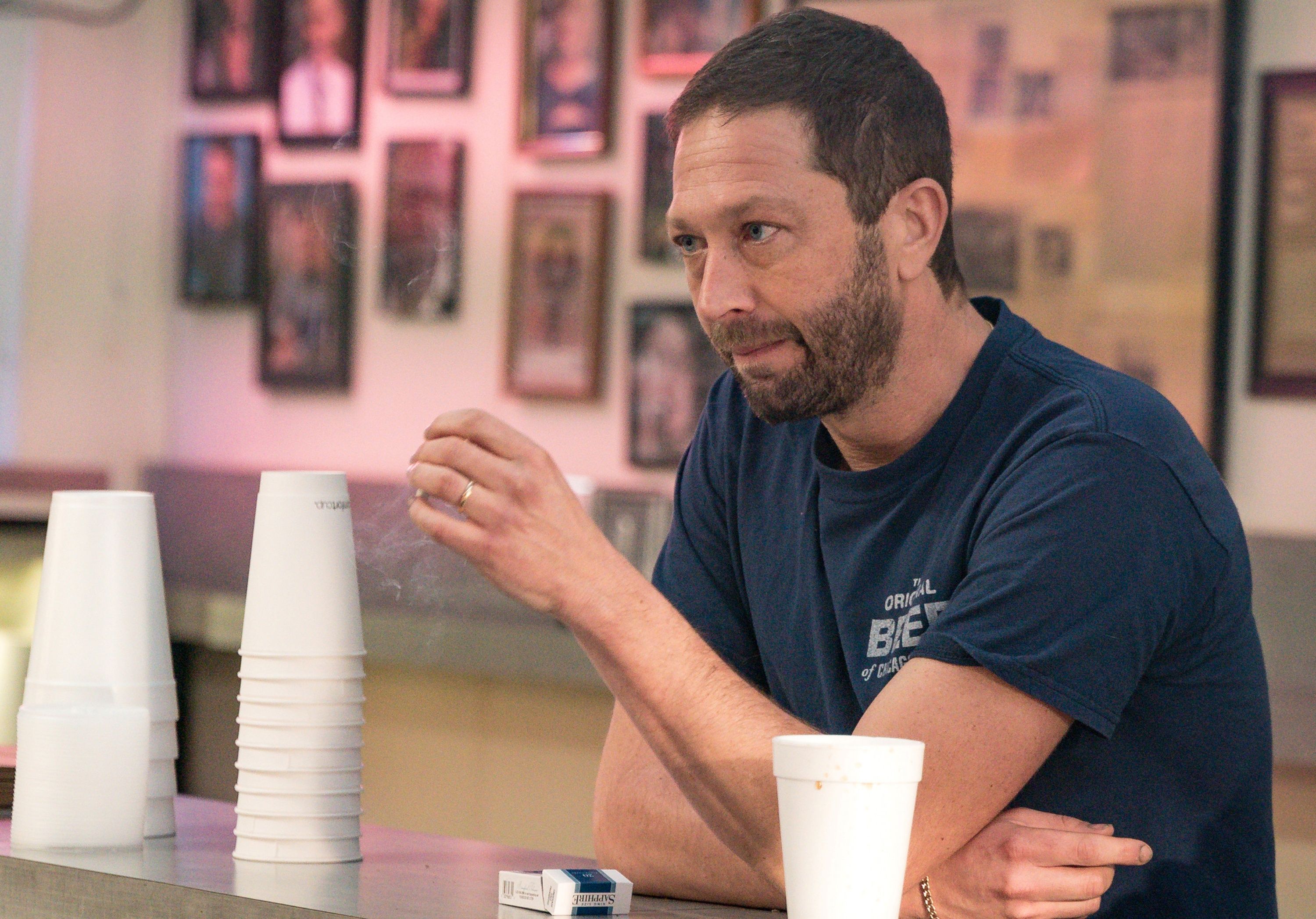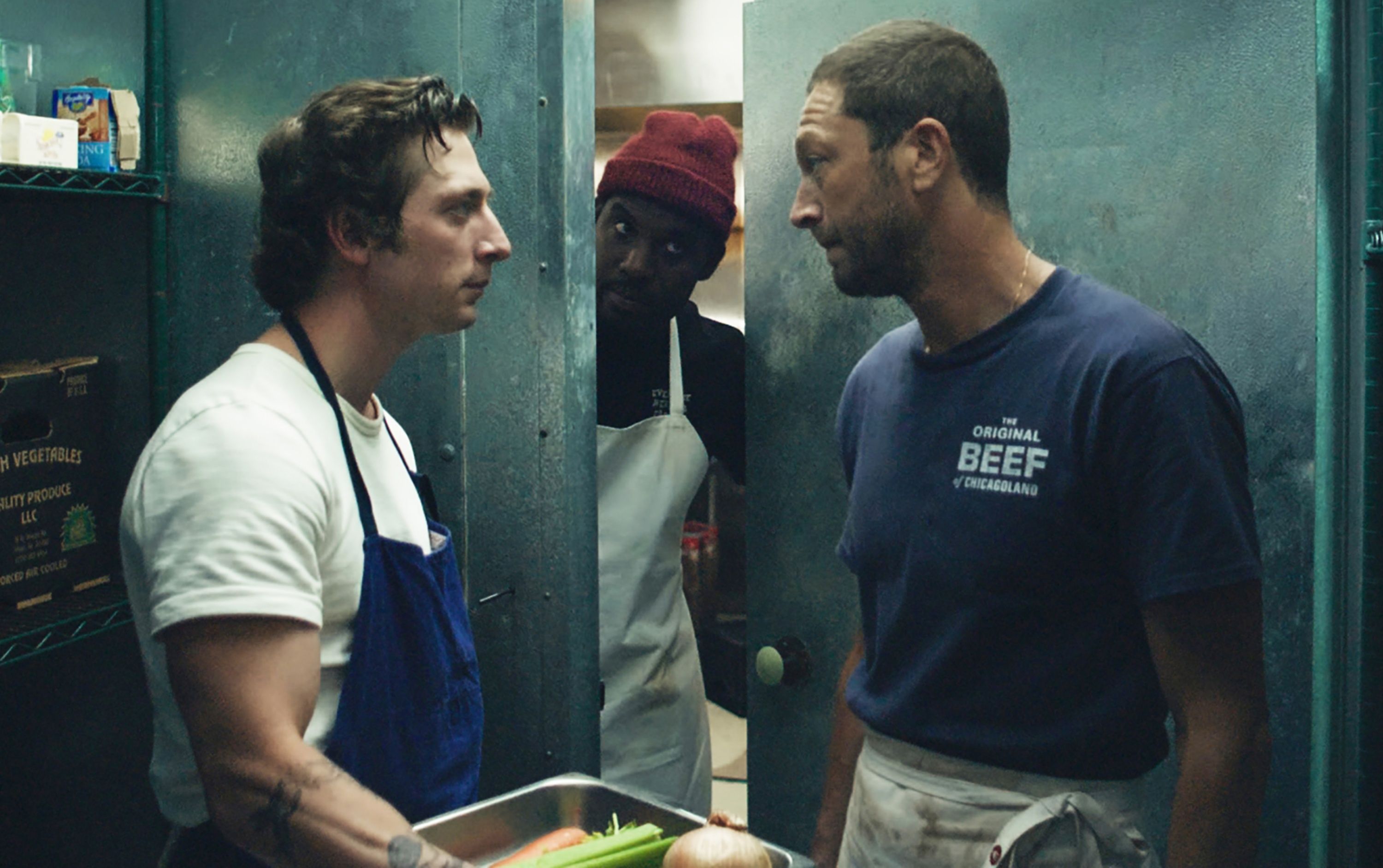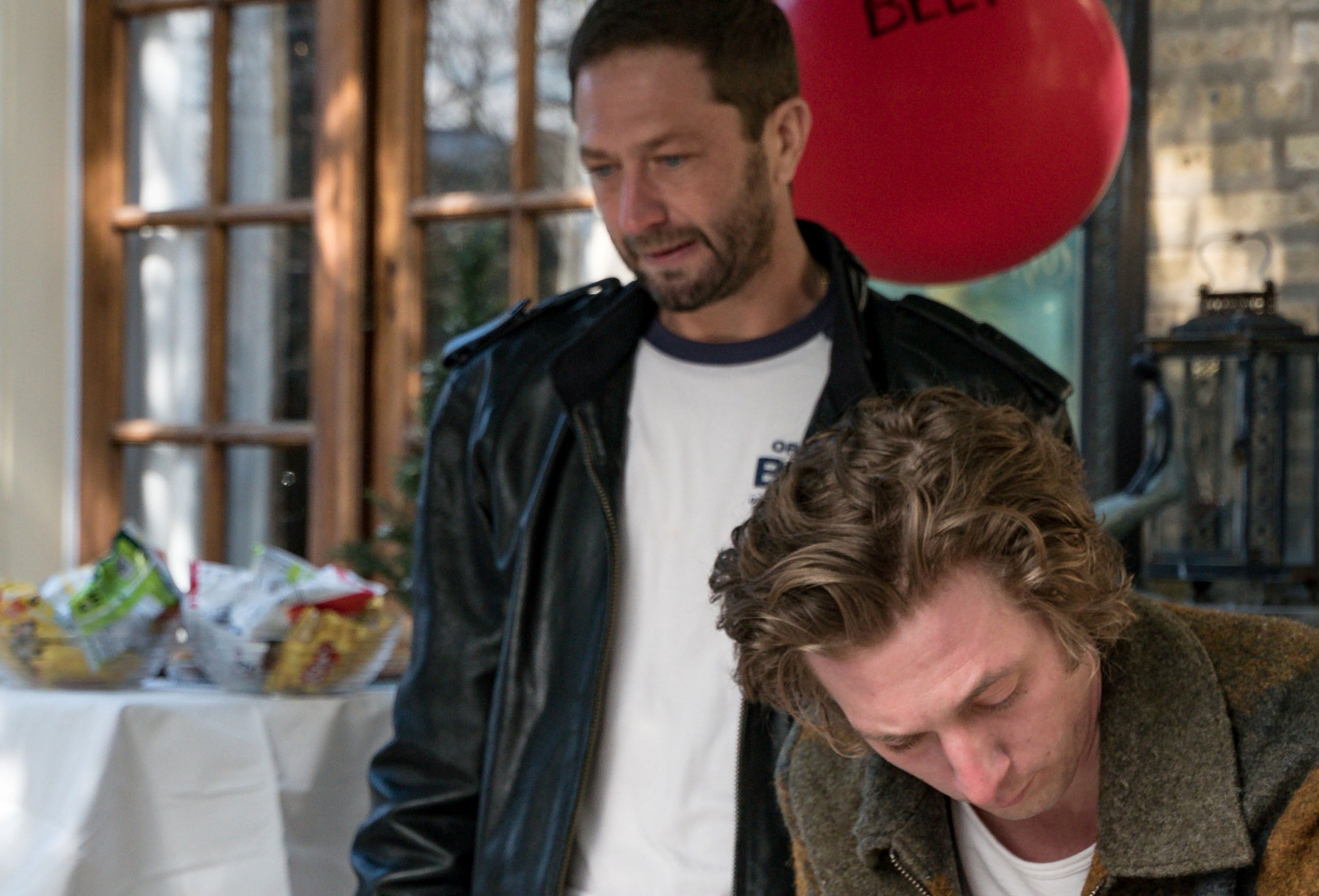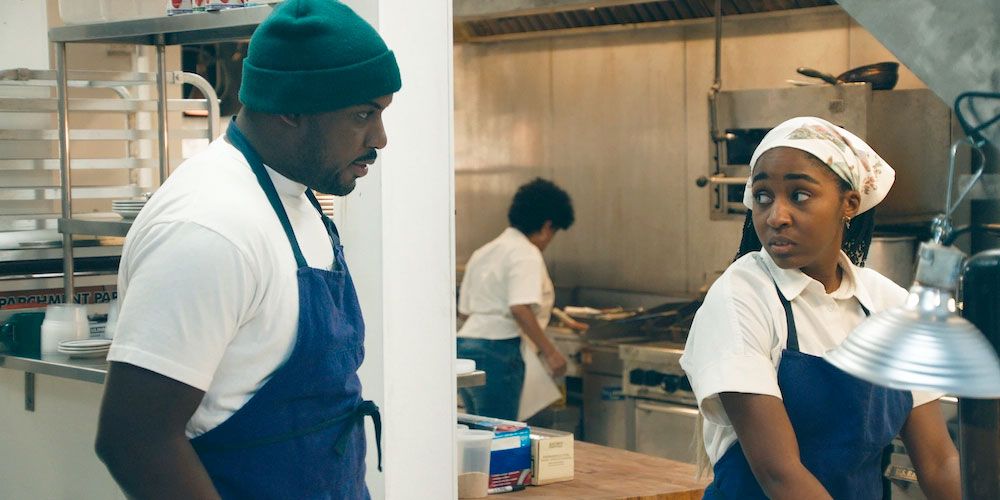[Editor’s note: The following contains spoilers for The Bear.]With the strength of its scripts, the beauty of its direction, and the exemplary work of its cast, it’s easy to see how and why FX’s The Bear (which streams on Hulu) became a hit. The half-hour, eight-episode series follows Carmen “Carmy” Berzatto (Jeremy Allen White), a young chef whose time in the fine-dining world almost broke him and who’s now returned home to Chicago after a death in the family, to transform his family sandwich shop. After diving in, Carmy realizes the staff at The Original Beef of Chicagoland is capable of so much more than they give themselves credit for, if only they can bring out those strengths in a way that works to their benefit, instead of tearing them apart.
Before shooting Season 2, Collider got the opportunity during the TCA Winter Press Tour to sit down with co-stars Ayo Edebiri (who plays Sydney, a professionally trained chef brought in as Carmy’s second-in-command) and Ebon Moss-Bachrach (who plays Richie, manager of The Beef and best friend of Carmy’s late brother, Mikey) for this interview about what it was like to get into a groove with the fast-paced series, how nice it’s been to see the way viewers have reacted, what it was like to take on the one-shot episode seven, their hope that they’ll continue to have their own expectations subverted, exploring the character dynamics, how they view the food industry now, and what it’s like to improvise on a show like this.
Collider: I love this show. I jumped into it not knowing what to expect and just could not stop watching. What did you guys expect from it? Did you go into this having any idea what it would be? Watching it felt fast-paced, claustrophobic and intense, at times. How did it feel for both of you?
AYO EDEBIRI: Yeah, it was definitely fast-paced, for sure, but it was exciting. For me, it felt different, and that was exciting and a little scary, but in a fun way. I don’t think I expected anything to this level. I’ve written for a lot of TV shows that are successful, and even that feels different. Maybe that’s just my perspective, as a writer. There’s so much TV and a lot of it is good, but this was unexpected, which was nice.
EBON MOSS-BACHRACH: Before we made the pilot, I read maybe three scripts, and I thought that they were really funny. And then, when we went to make the pilot in July in Chicago, what I was most surprised by was that it definitely had an energy. The scripts even have a certain level of energy that needs to be met. (Show creator) Chris [Storer] went well beyond that, in terms of the pace, and how fast he wanted people to talk, and how quickly he wanted people talking over each other. I like that, personally. In watching people’s performances and watching stories, in general, I like when it has a volatile feel to it, but this was so fast. He just kept saying, “Faster, faster, faster, faster.” And I’m not someone that’s really ever worked in a kitchen, and one of his goals was to get that frenetic, insane quality. I remember asking him, at one point, “Does too fast exist?” And he was like, “There’s really, literally no ceiling.” When we started to make the body of the season, things slowed down. But that first episode was really, really fast. And then, when I saw it, it was cut together in such a chaotic way, on top of the level of shooting.
Obviously, in this business, things are so weird. You can make the best show, and nobody may watch it. What was it like to start seeing that people were actually responding to the show and reacting to it and connecting to it, in the same way that you guys were, when you did it? Was there a moment when you realized that?
MOSS-BACHRACH: I don’t know if it was a moment. I was also gone, when it came out. I was not in the country. But for me, the response was deeply gratifying. We all made this show because we all cared so much about it. It’s a weird little show, so it’s surprising. It’s been so nice. I’m so proud of this weird little thing we did.
EDEBIRI: We got really lucky. It’s very nice.
MOSS-BACHRACH: FX was very smart about the way they released it, by having it all come out at once. I initially thought that was a bad idea.
EDEBIRI: Yeah, we were all a little stressed.
MOSS-BACHRACH: When you space it out every week, it generates more conversation.
EDEBIRI: But I think people were able to digest it, in a way that, if maybe you just watched the first episode, you might not. I think they were able to just digest it, by having it all together. When you watch episode seven on Hulu, there are no commercial breaks. I don’t know if it was FX or Hulu or Chris, or all combined, but they were like, “This is a one-shot and it needs to be seen that way.” Just allowing people to be able to watch the show like that really helped us.
What was the reality of doing that episode like, for you guys? When you got to episode seven, did you have actual preparation? Did you need mental preparation for that, especially with the whole stabbing incident that happens between your characters? What was it like to go into that and just go for it, from start to finish?
EDEBIRI: I loved it. It felt like doing a play. We had rehearsals, and then we just went for it. We had to really just make sure we were keeping it alive, for ourselves and for each other. I had a blast.
MOSS-BACHRACH: It’s very technical, doing something like that. You need to work out the choreography with the camera and props and people setting things behind the camera. The knife had to get set, and I had to have preset blood that would go off, at one point. There’s this concert of technical stuff that we rehearsed for a couple of days, until that became like muscle memory, and then we could put that to rest and concentrate on the connections between the actors and keeping it alive.
EDEBIRI: When you’re so aware of the technicality of it, it’s then about, how do we make sure that it doesn’t look like it’s too seamless because of the frenetic nature of the show and of the camera work. There was a take, maybe take four or five, where Chris was like, “It’s starting to get too good.” It was starting to get a little too comfortable and we were like, “Okay, this is the mark, this is how I hit it, this is how I move.” And he was like, “No, we need bumps. We need just a few of those moments.”
MOSS-BACHRACH: They were so smart with that Wilco song building. What I liked about it being one shot is that it’s really motivated by story. It’s not a flashy, “Look at me,” directorial choice. I love that some people didn’t realize that it was one shot.
EDEBIRI: And the episode also wasn’t initially supposed to be that. They had this idea and they were like, “If we can ground this in the story and in the characters and justify it, let’s do it. Let’s see what happens.” We didn’t have a ton of time, and the days leading up to it, I think about that moment really fondly, just sitting in chairs, in between takes, reading it and just being like, “How does this feel? Does this feel like it could work? Can we do it?”
Does it feel different going into Season 2? Now that people have seen the show and they’ve reacted to the show, is there more pressure? Are there more nerves about it? Do you feel more confidence because you know what the show is and how people felt about it?
MOSS-BACHRACH: That’s more of a question for the writers. I feel nervous for them. It’s much easier to create something when no one has any expectations. I go to a dark place. I don’t go to some kind of cocky, confident place. I go to, “Oh, God, I don’t wanna fuck it all up.”
EDEBIRI: As a writer, I also go to a dark place. My fear is that, when people receive something well, then they’re very excited to tear it down. I’m like, “Can we have the spirit of goodwill, please? We all love this show, and we love and respect each other.”
MOSS-BACHRACH: The national pastime is building somebody up, and then ripping them down.
EDEBIRI: Yeah. But all that negativity and gorgeous anxiety aside, I remember reading the first few episodes [of Season 1] that we got and just being so excited by the fact that I didn’t know where things were going. Chris and Joanna [Calo] and the writers are so good at subverting their own expectations. There would be moments while we were shooting when something would change because they’d be like, “We know where this goes or how this works, so let’s change it or let’s get rid of it. We don’t need it. We know that audiences are smart and that we don’t need to have a whole first episode explaining every single word of a kitchen. People will get it. People will understand that these people are human beings. They’ll get it, and they’ll be here with us.” I think that spirit will go into the second season, and I’m excited to have my own expectations subverted.
Do you feel like because you’re more invested in it now because you’ve spent a season with these characters and you’re ready to defend them and advocate for them, if there’s something you don’t feel lines up with who they are? Or are you even more trusting of your showrunners now?
EDEBIRI: Trust is a two-way street. Something I’ve always enjoyed about working with Chris is that nothing is without intention. He’s open to collaboration and he’s open to conversation. If you don’t understand it, or if you don’t get it, or whatever, then it’s a conversation about why. Everything is open, in a nice way.
MOSS-BACHRACH: Even with the first season, very early on, you have to take ownership of your character and you have to become the expert on them. The smart directors that I’ve worked with all understand that, at a certain point, the actor knows.
EDEBIRI: That’s the fun of it, I think. Yeah, I know, absolutely, but also, so do the writers who have been writing for six months, with each other, in a stinky room, talking about this thing, over and over and over again. Chris is very good at curating people who all know, and we all wanna get on the same page of knowing. That’s the fun of it and the challenge of it.
There’s something so fun about watching the relationship between Sydney and Carmy, and them figuring each other out, because they’re strangers coming into this and they really have to figure out what their dynamic is going to be. When I spoke to Jeremy Allen White about the first season, he talked about how Carmy sort of apologized and that Sydney sort of accepted his apology, but that they’re in a bit of a weird place, where you don’t know what will happen next. What do you want to see from that dynamic?
EDEBIRI: Just seeing where that goes. With Sydney and Richie too, there’s a lot of fun there. I was getting a lot of mean messages that were like, “You didn’t apologize to Richie!” And I was like, “And Richie didn’t apologize either.” They’re two stubborn people. That was both of their versions of an apology, with Richie being the one who’s like, “Come in,” and her being like, “Yeah, okay.”
MOSS-BACHRACH: To me, the tomato-drenched money is the most tentative of Band-Aids. I don’t think anything is healed there, at all.
EDEBIRI: I remember talking about it with Chris and he was he was like, “It’s so funny, it’s the most ridiculous thing, where it seems like a salve, but it’s actually the opposite.” That’s exciting. I had a friend once who said, “Sometimes the hardest thing is getting what you want,” and I feel like that’s gonna be a potential journey for everybody.
I love a show where you think, by the end, that you’ve got a handle on what it is, but that something happens that makes you wonder what that will mean for everybody. That’s how it felt at the end of the first season, which I’m actually really excited about because now I have no idea what to expect with Season 2.
EDEBIRI: Yeah, we don’t fully know either.
Is it exciting to not fully know, or is that a weird place to be in?
MOSS-BACHRACH: It’s a normal place. You often don’t know what’s coming from your character on the show, a lot of the time. With this show, we’ll get all of the scripts and read all of the scripts, so we’ll have a sense of that. But usually, when I’ve worked on other stuff, you don’t get the script until maybe two weeks before you start shooting the episode, so you never really know, as in life.
EDEBIRI: I think that’s exciting.
MOSS-BACHRACH: I’m excited.
EDEBIRI: It’s not like they’ll go, “We have no ideas, so Sydney is gonna go to Antarctica and Richie is gonna become a hedge fund guy.” It’s nice knowing that we’ll get to go back and be with each other in the cold soup.
Does it feel like you’ll need a little bit of an adjustment period, to get in the groove of all of you being back together and doing that pace of dialogue again?
MOSS-BACHRACH: Yeah, I think so. I really hope we have some time to rehearse. You can’t go from sitting to sprinting like that. It definitely will take me some time to get that Chicago back in me. Unfortunately, I don’t walk around with that. I have to be a responsible member of my family. I can’t be a lunatic like that. So, hopefully, we’ll get out to Chicago sometime before and be in the space. I imagine we will.
EDEBIRI: It will be nice to go back. It’ll be interesting, now that the show is out and I know that people have watched it. The fun part, last time, was that no one really knew.
MOSS-BACHRACH: We were making it in this sleepy section of the stages in Chicago. It’s all Chicago P.D. and Chicago Med. Those are the known shows in Chicago, and they’ve got these huge crews. We were just quietly making this weird thing that nobody knew what it was. I love working like that, in our little lab, doing this thing. It will definitely be different. It’ll be easier to get a table.
EDEBIRI: Definitely.
How does it make you look at that industry now? What did you learn about how all of that works?
MOSS-BACHRACH: I love to cook and, if you love to cook, inevitably at some point, someone’s been to your house and said, “Oh, my God, you’re so great, you should open a restaurant,” and you think about it for a second. I will not ever think about that. It seems like such an insane thing to do, to open up a restaurant. It’s just a bad idea that people can’t resist. People open them, and then they open more, and then they open more. Our show isn’t about celebrity chefs, but if you walk around with Matty Matheson, people pull over their cars and people run after him. It’s very much like being with a rock star.
EDEBIRI: I also think there are different ways to do it. A lot of Sydney’s journey, and what I would talk a lot about with Coco, Courtney Storer, Chris’ sister who worked on the show, and other female chefs when I was stodging and studying, was that, when you’re not the guy with tattoos who’s six feet tall, or whatever, and you’re a woman in this space, people have their own preconceptions of how you should command energy and how you organize people and how you move in that space. That was something that I found really interesting. I found a lot of parallels between my own career and a lot of other young women in those spaces, where a lot of it’s the same, which is both cool and, at times, disheartening.
You have to find your own voice, in a circumstance like that, but then you also have to have people listen to your voice, which doesn’t necessarily line up, at the same time.
EDEBIRI: There’s a lot of, “Well, you’ve gotta pay your dues,” energy. Why? Why are those still the dues? Those shouldn’t be the news anymore. Even the act of staging, itself, was unpaid for decades. Only now, do you get minimum wage, if you stage. Why are we doing unpaid internships? Why are we doing that still?
And why is that still accepted?
EDEBIRI: Yeah. I feel like there are similar energies to those fields. Maybe that’s just post Me Too, Black Lives Matter, COVID, and everything. There’s been a lot of reflection in a lot of different industries, with standards of work and standards of living and behavior.
MOSS-BACHRACH: Because we’ve always done it that way doesn’t mean it should be acceptable. What I love in the character of Sydney is this tension between having to inspire confidence in her kitchen, but with so much doubt, at the same time. How do you project one thing while you’re feeling something else? That’s a really fascinating place for a character to live in.
EDEBIRI: With Sydney and Carmy, everybody else in the kitchen, I feel like, views them as, “You’re coming from like this different world and you’re trying to inject that into this space. This is our sacred space. It’s a little grimy, but it’s ours. It’s what we do. You’re trying to change it and inject it with this different thing. But between them, there’s a lot of differences. They have similar aspirations and similar backgrounds, in a lot of ways, but in a lot of ways, they don’t. There are points in the season where you see Carmy become that thing that he said he wasn’t gonna become, but he also doesn’t know any other way, and it’s hard to change.
MOSS-BACHRACH: He’s formed, but broken. And Sydney is trying to figure out who she is.
EDEBIRI: I think about that a lot. There’s nobody who’s exactly doing what I want or what I’ve seen, and that’s like good. That’s freeing because that means that I can do it, but that’s also really scary because there’s no blueprint. Then, it’s about, how do you make the blueprint? And you realize, “Oh, I have to make the blueprint. Okay.”
Richie is interesting because he’s in this position, but we don’t know if he really wants it. As everything is changing around him, he has to figure out if he’s okay with that.
MOSS-BACHRACH: Uh, yeah. He’s drowning. He’s trying to find firm ground. He’s pretty lost.
What would you want for him? What do you think would make him happy?
MOSS-BACHRACH: He has desires for himself and I, as the person that played him, it’s not interesting to play a character who’s at peace and who’s figured it all out. That’s a snooze. I like his struggles and his chaos. If you’re playing somebody who is drowning, there’s always something to do. The fight and the struggle is quite active. I’m not gonna share the things that I hope for him. I don’t think he’s hopeless. There are probably things that would make his life a lot better, for sure. He’s also deeply grieving.
It feels like he could use some therapy and a hug.
MOSS-BACHRACH: Yeah, definitely.
Which could work for a lot of these characters.
EDEBIRI: Or everybody.
MOSS-BACHRACH: Yeah, all of us.
What the characters choose to cook and how they cook it feels like it says a lot about what they’re going through, in that moment.
EDEBIRI: Matty and Courtney are so good at expressing themselves and their creativity and their feelings through food.
MOSS-BACHRACH: So much is revealed in what Carmy makes for himself when he’s home, which he just smears peanut butter on a piece of white bread and has some chips, and then passes out on the couch. I’ve seen articles about chefs’ refrigerators and there’s never any food. There will be sauces and booze.
EDEBIRI: David Silver is fermenting a hundred different things in jars.
MOSS-BACHRACH: It’s probably not even in the fridge. It’s probably just getting funky in the basement or the garage, or something.
EDEBIRI: Everybody’s got their own version of that, though. There are people that can’t express themselves in words, but they can express themselves with food. I went home for the holidays, and we’re not a chatty family, but my mom made four different things for dinner, and it was just, me, her, and my dad. She was like, “Do you want ham? Do you want soup? There’s this chicken that I made? Or do you want rice and peas, or vegetables?” I’m like, “You love me and you missed me, and now you’re making seven different dinners on one night, even though I’m staying for three more days.”
MOSS-BACHRACH: That’s her testimony of her love for you. Ayo’s mom is making a cookbook for Ayo, of her dishes. That’s like a love letter. That’s incredible.
EDEBIRI: Yeah. But she’s somebody where that’s how she’s always expressed herself because words are hard. If you make somebody their favorite dish, that’s how she shows herself. If my aunt across town is sick, my mom is gonna make a whole soup and 17 frozen sauces.
When you guys have conversations with the creative team, do they tell you that they know where your characters end up? Do they have a sense of where all of this is headed?
EDEBIRI: It’s tricky. You do have a sense. You do have a blueprint. You do have things you want. But then, as you write, things change. As [the actors] bring things to life, things change. Things can have a different tension and an actor suddenly brings it to life in a new way, and you’re like, “Even though I know and have a sense of who this character is, it’s alive now, in a way that’s different.”
MOSS-BACHRACH: To get a show made, you have to go to the network with your bible and say, “This is the journey.” But then, once you’re making it, you have a stronger sense of where those characters are headed.
Is it sometimes easier than to not have all of that information, when things could change?
EDEBIRI: I wouldn’t say it’s easier, but it’s knowing that’s the name of the game. Based on what we experienced, working with Chris, that openness to conversation and collaboration makes me feel okay. But yeah, I’m nosy and I wanna know what’s going on. I wanna be able to have things early, so that I can sit with them longer. But it’s also fine not to know everything. I feel like Chris likes to keep things back, especially in certain moments of the show that he wants to keep fresh.
MOSS-BACHRACH: He likes to play it coy sometimes.
EDEBIRI: I feel like that has to do with the comedy part of it. When we first started shooting, I was like, “I love this. I love sometimes doing three takes of something, and then it’s done. With comedy, after awhile, it stops being fresh because you know what the punchline is and you know how to hit the beats, and you start getting bored. And then, you wanna improvise or completely change how you’re doing it because you get bored.
Is it harder to do improvisation on a show like this, where like so many pieces have to fall into place at the right time?
MOSS-BACHRACH: On good days, everyone is really in sync and there’s so much unspoken communication and a simpatico that the improvisation works. Ayo is more of an improviser than I am, but it’s not disruptive, if it comes from an organic place and it comes out of whatever is happening in that room, at the time. If it works, people respond in kind, on good days.
EDEBIRI: There’s this idea that improv is going completely off script, and it’s not like that. Also, if it doesn’t need it, then don’t do it. Leave it alone.
MOSS-BACHRACH: I’ve been on sets where there’s a lot of improvisation and it just becomes a lot of talking. You can also improvise in silence, with listening and movement. Uncomfortable silence can be improvisation, as well. You don’t have to be talking all the time.
EDEBIRI: Yeah, a hundred percent. I think about Jeremy, at the end of episode seven.
MOSS-BACHRACH: Where he throws the sharpie at whatever that machine (that receives the to-go orders) is called. When you have those impulses, you do have to recognize them. I like those improvisations that are non-verbal.
EDEBIRI: That’s keeping it alive and fresh, for each other and for yourself.
MOSS-BACHRACH: The writing is so good. Most of the time, when I would improvise, it would be in rehearsals, just to explore, and figure out the energy of the thing, or what was going on. Sometimes I’d have to talk it out to bring some of the subtext to the foreground, to figure out what was going on with me, or with other people. I love the writing so much that, when it was time to shoot, I’d go back to the words on the page.
The Bear is available to stream at Hulu.

